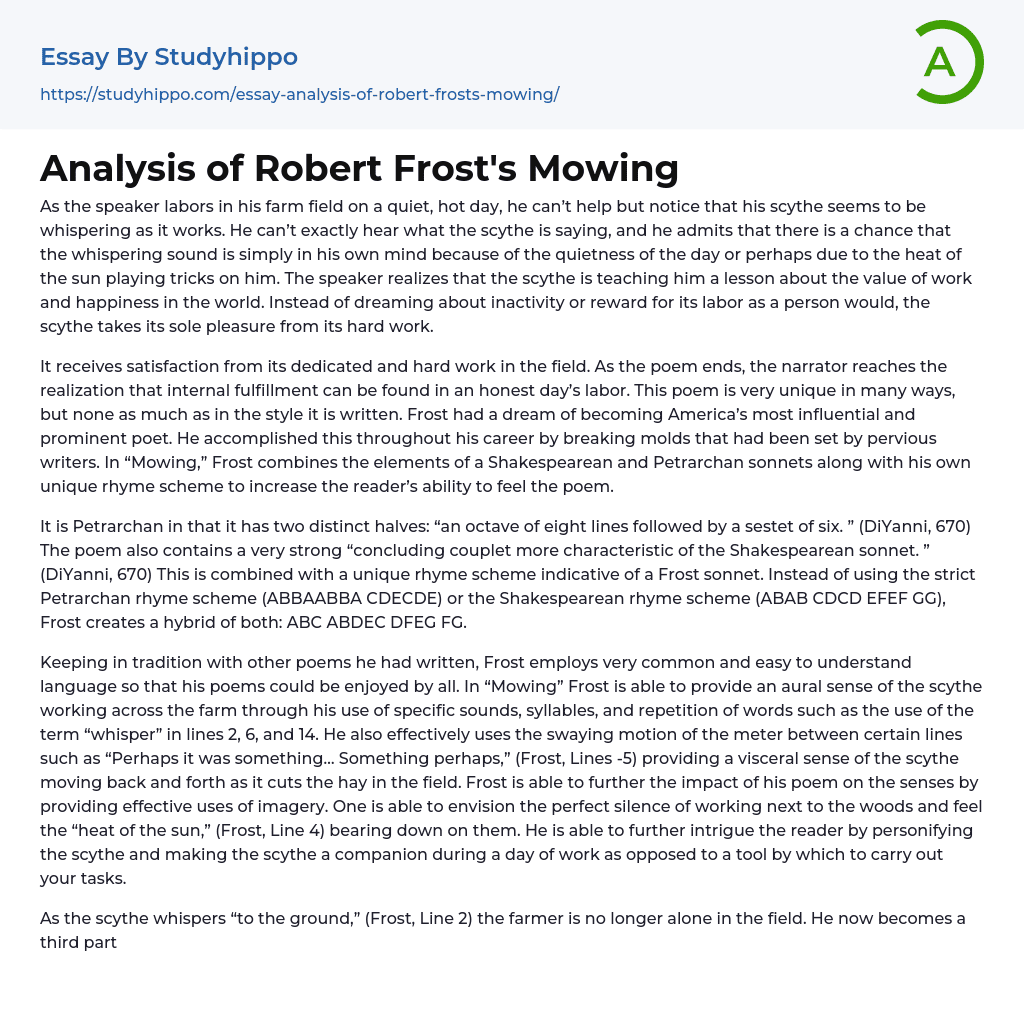As the speaker labors in his farm field on a quiet, hot day, he can’t help but notice that his scythe seems to be whispering as it works. He can’t exactly hear what the scythe is saying, and he admits that there is a chance that the whispering sound is simply in his own mind because of the quietness of the day or perhaps due to the heat of the sun playing tricks on him. The speaker realizes that the scythe is teaching him a lesson about the value of work and happiness in the world. Instead of dreaming about inactivity or reward for its labor as a person would, the scythe takes its sole pleasure from its hard work.
It receives satisfaction from its dedicated and hard work in the field. As the poem ends, the narrator reaches the realiza
...tion that internal fulfillment can be found in an honest day’s labor. This poem is very unique in many ways, but none as much as in the style it is written. Frost had a dream of becoming America’s most influential and prominent poet. He accomplished this throughout his career by breaking molds that had been set by pervious writers. In “Mowing,” Frost combines the elements of a Shakespearean and Petrarchan sonnets along with his own unique rhyme scheme to increase the reader’s ability to feel the poem.
It is Petrarchan in that it has two distinct halves: “an octave of eight lines followed by a sestet of six. ” (DiYanni, 670) The poem also contains a very strong “concluding couplet more characteristic of the Shakespearean sonnet. ” (DiYanni, 670) This is
combined with a unique rhyme scheme indicative of a Frost sonnet. Instead of using the strict Petrarchan rhyme scheme (ABBAABBA CDECDE) or the Shakespearean rhyme scheme (ABAB CDCD EFEF GG), Frost creates a hybrid of both: ABC ABDEC DFEG FG.
Keeping in tradition with other poems he had written, Frost employs very common and easy to understand language so that his poems could be enjoyed by all. In “Mowing” Frost is able to provide an aural sense of the scythe working across the farm through his use of specific sounds, syllables, and repetition of words such as the use of the term “whisper” in lines 2, 6, and 14. He also effectively uses the swaying motion of the meter between certain lines such as “Perhaps it was something… Something perhaps,” (Frost, Lines -5) providing a visceral sense of the scythe moving back and forth as it cuts the hay in the field.
Frost is able to further the impact of his poem on the senses by providing effective uses of imagery. One is able to envision the perfect silence of working next to the woods and feel the “heat of the sun,” (Frost, Line 4) bearing down on them. He is able to further intrigue the reader by personifying the scythe and making the scythe a companion during a day of work as opposed to a tool by which to carry out your tasks.
As the scythe whispers “to the ground,” (Frost, Line 2) the farmer is no longer alone in the field. He now becomes a third party to a conversation between his tool and the ground, merely an observer, privy
to an intimate line of thoughts. As the poem comes around full circle back to the speaker’s original thoughts, he now seems moved and enlightened by the lesson taught to him by his simple farming tool. He seems to realize now that joy and satisfaction are not found in distant fantasies and will not be handed to you for nothing.
True happiness and fulfillment can be found in the simple task of performing the job you were meant to do. The scythe would not be content milling the grain nor would the farmer be happy as a banker. As Frost finalizes his poem,”The fact is the sweetest dream that labor knows. My long scythe whispered and left the hay to make,” (Frost, Lines 13 – 14) he is saying that the only dream that we have is to do what we were meant to, just as the scythe cuts the grass and the farmer leaves it in rows to make hay.
- Allegory essays
- Alliteration essays
- Comedy essays
- Comic book essays
- Drama essays
- Dystopia essays
- Fairy Tale essays
- Fantasy essays
- Fiction essays
- Ghost essays
- Gothic Fiction essays
- Gothic Literature essays
- Irony essays
- Legend essays
- Memoir essays
- Novel essays
- Poetry essays
- Satire essays
- Science Fiction essays
- Short Story essays
- The western essays
- Tragedy essays
- Witchcraft essays
- American Literature essays
- Between The World and Me essays
- Book Report essays
- Book Review essays
- Book Summary essays
- Books essays
- Character essays
- Coming of Age essays
- Dante's Inferno essays
- Everyday Use essays
- Flowers for Algernon essays
- Genre essays
- Greek Mythology essays
- Incidents in The Life of a Slave Girl essays
- Letter essays
- Literary Criticism essays
- Literary devices essays
- Literature Review essays
- Metaphor essays
- Myth essays
- Play essays
- Plot essays
- Poem essays
- Poetry Analysis essays
- Protagonist essays
- Reader essays
- Reason essays




